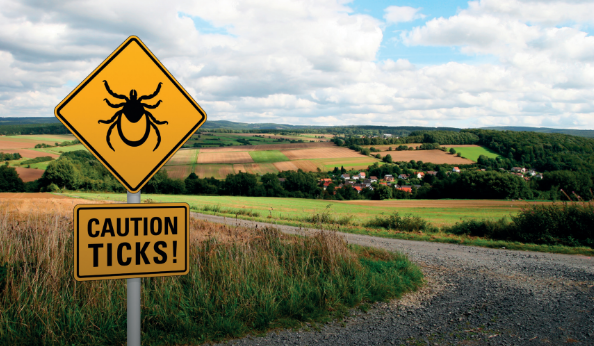★ Win a Schöffel Country shooting coat for everyone in your syndicate worth up to £6,000! Enter here ★
Tick Bite Awareness – The British Deer Society
Stay alert to the symptoms of tick-borne infections suck as Lyme disease, warns Charles Smith-Jones

You may be already familiar with the risks associated with tick bites. However, with summer in full swing, it’s a timely moment to revisit this important issue. The UK Health Security Agency has issued updated advice on tick bite prevention and awareness – particularly relevant with confirmed cases of tick-borne encephalitis (TBE) now emerging in parts of England.
Why Tick Bites Matter
Ticks are more than a nuisance, they can transmit several infections to humans. While Lyme disease remains the most well-known tick-borne illness in the UK, tick-borne encephalitis (TBE) is now also on the radar. Both can have serious health implications if not promptly recognised and treated.
How to Protect Yourself from Tick Bites
The best defence against tick-borne illness is prevention. Here’s how to reduce your risk:
- Wear protective clothing: Long sleeves and trousers can help shield your skin. Light-coloured fabrics make it easier to spot ticks.
- Use insect repellent: Apply repellent containing DEET to exposed skin and clothing.
- Stay on clear paths: Avoid brushing against long grass, undergrowth, or bracken where ticks are more common.
- After Outdoor Activities: Check for Ticks
After spending time outdoors, take a moment to check:
- Your skin (especially around the ankles, waist, armpits, and scalp)
- Your clothing
- Pets that have accompanied you
If you find a tick
Remove it as soon as possible using a tick-removal tool or fine-tipped tweezers. Do not though, use any methods such as burning, squeezing, or applying substances that may make the tick regurgitate infected fluids. Even if you remove a tick quickly, stay vigilant for symptoms of Lyme disease or TBE in the weeks that follow.
Lyme Disease Symptoms
- Flu-like symptoms
- Bull’s-eye rash (though not always present)
- Nerve pain, facial droop, or tingling in limbs
- Early treatment with antibiotics is usually very effective. If left untreated, Lyme disease can lead to:
- Multiple rashes
- Shooting nerve pain
- Joint swelling or palpitations
Even in later stages, most people still respond well to antibiotics, though some may experience lasting effects on joints or the nervous system.
What You Need to Know About Tick-Borne Encephalitis (TBE)
TBE is a viral infection that has only recently been confirmed in ticks in parts of England. Although still very rare in humans, awareness is vital. Possible TBE Symptoms can include:
- Mild flu-like illness
- Severe headache
- High fever
- Stiff neck
- Sensitivity to light
In more serious cases, TBE can cause inflammation of the brain (encephalitis) or meningitis. Seek urgent medical attention if you experience seizures (especially if you’re not epileptic), confusion or behavioural changes, weakness or paralysis or vision problems or slurred speech.
When to Seek Medical Advice
If you develop symptoms following a tick bite, contact your GP or NHS 111 immediately mentioning where you’ve been and whether you were bitten. Prompt diagnosis and treatment can make all the difference. While Lyme disease and TBE are uncommon, early action can prevent serious and unnecessary complications.
Join the British Deer Society to support its vital national work
You’ll receive a quarterly journal and regular e-newsletter with the latest news, events and updates. Its 16 regional branches provide further opportunities to meet like-minded enthusiasts and take part in range days, social events and other activities.
Find out more at bds.org.uk
Related Articles
Get the latest news delivered direct to your door
Subscribe to Shooting Times & Country
Discover the ultimate companion for field sports enthusiasts with Shooting Times & Country Magazine, the UK’s leading weekly publication that has been at the forefront of shooting culture since 1882. Subscribers gain access to expert tips, comprehensive gear reviews, seasonal advice and a vibrant community of like-minded shooters.
Save on shop price when you subscribe with weekly issues featuring in-depth articles on gundog training, exclusive member offers and access to the digital back issue library. A Shooting Times & Country subscription is more than a magazine, don’t just read about the countryside; immerse yourself in its most authoritative and engaging publication.







